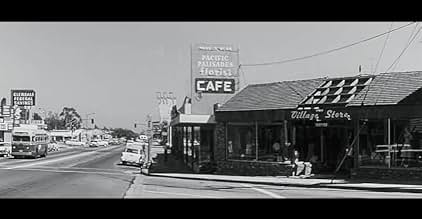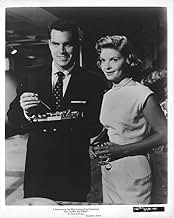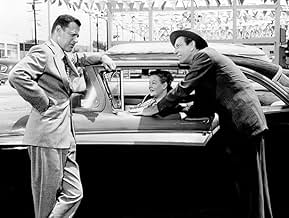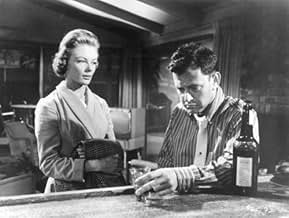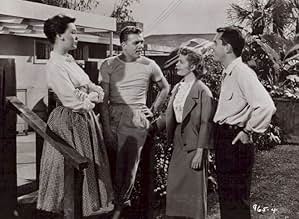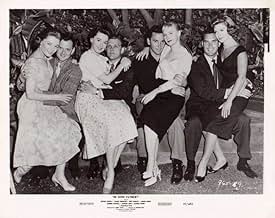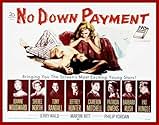IMDb रेटिंग
7.1/10
1.3 हज़ार
आपकी रेटिंग
अपनी भाषा में प्लॉट जोड़ेंIn California, four couples who have bought houses near one another face problems, alcoholism, racism, promiscuity, and discrimination against lack of education, until a tragic event forces ... सभी पढ़ेंIn California, four couples who have bought houses near one another face problems, alcoholism, racism, promiscuity, and discrimination against lack of education, until a tragic event forces them to reassess their lives.In California, four couples who have bought houses near one another face problems, alcoholism, racism, promiscuity, and discrimination against lack of education, until a tragic event forces them to reassess their lives.
- निर्देशक
- लेखक
- स्टार
- 2 BAFTA अवार्ड के लिए नामांकित
- 1 जीत और कुल 2 नामांकन
Robert H. Harris
- Markham
- (as Robert Harris)
Robert Burton
- Mr. Cagle
- (बिना क्रेडिट के)
Mary Carroll
- Mrs. Burnett
- (बिना क्रेडिट के)
George Chester
- Car Attendant
- (बिना क्रेडिट के)
Heinie Conklin
- Church Member
- (बिना क्रेडिट के)
Frank Gerstle
- Verdun
- (बिना क्रेडिट के)
Mimi Gibson
- Sandra Kreitzer
- (बिना क्रेडिट के)
Charles Herbert
- Michael Flagg
- (बिना क्रेडिट के)
फ़ीचर्ड समीक्षाएं
The performances of Pat Hingle and Barbara Rush seem very modern to me. When he washes the car while the rest of the community goes to church, she gently admonishes him for not going to church, but conveys to the audience that this has long been a point of contention between them, and that she understands his reasons - just as he understands her desire to have him attend church. However, like any intelligent wife, she doesn't go over old ground; she simply suggests a compromise. She negotiates with him quickly and easily by suggesting that he wash the car after church from now on. He easily agrees, and the matter is settled. In at least three other scenes,they're shown disagreeing about various issues - however, they do it calmly and maturely, and with a healthy dose of humor.
One scene explains, with charm, that they are simpatico in the bedroom, too. She doesn't make him bust his chops wooing her, and she doesn't pretend that she isn't interested, like good little 1950's girls were supposed to do,
Most moving is a scene in which they have their worst disagreement, and both actors effectively evoke their unhappiness about not being on the same page. One senses that this couple is very close, and that they derive strength from their partnership. After this worst disagreement, they attend a party at which Pat Hingle approaches his wife in a tender way, and asks her to dance. She agrees immediately, and in the following scenes, we see them dancing happily, and exchanging reassuring looks.
I think this couple's marriage depicts a healthy relationship. They're always ready to calmly discuss things, to hear each other out, and be fair. Their goal in any discussion seems to be reaching a fair agreement, and getting back to being good friends, as well as lovers.
In my opinion, Pat Hingle helms this movie. The other characters seem dated. For example, Hingle is the only one who jumps up to call the police after a crime has been committed; Hingle is the only one who is sensibly, not insanely, ambitious; Hingle is the only one who doesn't seem interested in other women; Hingle is the only one who considers his wife a partner, and values her opinion; Hingle is the one who is physically affectionate with his children; and most importantly, Hingle is the one who raises questions about racism and intellectual bigotry. And thanks to the script, he isn't a crusader. He is a man who is open-minded enough to contemplate these issues as they are presented to him, and to question the passive bigotry that he comes to realize has been ingrained in him by his family and country.
Hingle and Rush's characters ring true, and are beautifully portrayed by the actors. The other characters are broadly-drawn, one dimensional, and have not aged well.
One scene explains, with charm, that they are simpatico in the bedroom, too. She doesn't make him bust his chops wooing her, and she doesn't pretend that she isn't interested, like good little 1950's girls were supposed to do,
Most moving is a scene in which they have their worst disagreement, and both actors effectively evoke their unhappiness about not being on the same page. One senses that this couple is very close, and that they derive strength from their partnership. After this worst disagreement, they attend a party at which Pat Hingle approaches his wife in a tender way, and asks her to dance. She agrees immediately, and in the following scenes, we see them dancing happily, and exchanging reassuring looks.
I think this couple's marriage depicts a healthy relationship. They're always ready to calmly discuss things, to hear each other out, and be fair. Their goal in any discussion seems to be reaching a fair agreement, and getting back to being good friends, as well as lovers.
In my opinion, Pat Hingle helms this movie. The other characters seem dated. For example, Hingle is the only one who jumps up to call the police after a crime has been committed; Hingle is the only one who is sensibly, not insanely, ambitious; Hingle is the only one who doesn't seem interested in other women; Hingle is the only one who considers his wife a partner, and values her opinion; Hingle is the one who is physically affectionate with his children; and most importantly, Hingle is the one who raises questions about racism and intellectual bigotry. And thanks to the script, he isn't a crusader. He is a man who is open-minded enough to contemplate these issues as they are presented to him, and to question the passive bigotry that he comes to realize has been ingrained in him by his family and country.
Hingle and Rush's characters ring true, and are beautifully portrayed by the actors. The other characters are broadly-drawn, one dimensional, and have not aged well.
I grew up in a post ww11 housing development, and all the characters of No Down Payment were our neighbors and family. Right down to the racial discriminating, only Mexicans were the people our neighborhood discriminated against. A pity. The buying of new cars,and ex-servicemen unable to find their niche, still living their war glory days. And young women who weren't really ready for married life,like the character portrayed by Joanne Woodward. The actors playing the characters were so believable, Pat Hingle even looked the part of the put upon successful man, Tony Randle played a depressed alcoholic,Jeffrey Hunter was an excellent college educated young man. I knew all these characters while growing up in a post ww11 housing development. Now I want to buy a copy of this excellent film.
The script is sharp and at times, poignant, the acting is superb, and the overall impact is overwhelming. It peels the label off of the seemingly happy suburban couples and, in so doing, provides the sharpest snapshot ever put to film about a time and place that no longer exists, the one that was written about by such giants as Updike and Cheever. The only problem with this movie is that it's only shown on TV about once every ten years and it's not available on video. One last comment. After watching this movie, you'll never look at Tony Randall in the same way.
"No Down Payment" is truly one of the great lost Fifties movies. Released in 1957, the year that the forced integration of Little Rock and the Soviet's launching of Sputnik forced America out of it's smug complacency, this movie truly shows us another side of suburban utopia. This flick was filmed when suburban California seemed to be everyone's ideal of the good life which, from the start, this movie portrays quite well. Barbecues with the neighbors, kids playing in the yard, trimmed lawns and freshly painted houses, this neighborhood has it all. What could go wrong?
The fact that Jeffrey Hunter and Patricia Owens were, frankly, not as good in their vocation as their fellow actors, somehow works very well here. They play the new couple in the neighborhood. They're naive, filled with expectations and enthusiastic to make a home in this cozy corner of the suburbs and they manage to give the viewer a similar feeling. We want what they want - the perfect neighbors - supportive friends and caring advisers who still allow us our privacy and our boundaries. That's what this great cast has to offer...they're perfect.
But are they? Skillfully, we begin to catch on to these neighbor's individual character defects. Joanne Woodward, fresh off "Three Faces of Eve", plays her character with her usual complex aplomb. Sheree North and Barbara Rush, two Fifties beauties, are comfortable here with their good looks and their knack for understanding men..or perhaps it's manipulating men? As always, Cameron Mitchell takes his man's man character in an unexpected direction. And Pat Hingle, often the embodiment of stability in his roles, takes it all in stride or does he? Then there's Tony Randall, sidekick of Rock Hudson in all those great light Doris Day comedies. Tony Randall gives us a character we'll never forget...this performance proves Randall was and is a great, great actor.
Four husbands, four wives, eight stunning acting performances. Was the dream offered to us by "Father Knows Best" and Ozzie's family really too good to be true? Maybe not - suburban California is a far cry from the inner city tenements so many of our ancestors dwelt in...Except, this is 1957. The turbulent Sixties are just around the bend. California is about to explode into riots, war protests and hippies searching for the bum trip tent. Besides, you know what they say about something being too good to be true..........
The fact that Jeffrey Hunter and Patricia Owens were, frankly, not as good in their vocation as their fellow actors, somehow works very well here. They play the new couple in the neighborhood. They're naive, filled with expectations and enthusiastic to make a home in this cozy corner of the suburbs and they manage to give the viewer a similar feeling. We want what they want - the perfect neighbors - supportive friends and caring advisers who still allow us our privacy and our boundaries. That's what this great cast has to offer...they're perfect.
But are they? Skillfully, we begin to catch on to these neighbor's individual character defects. Joanne Woodward, fresh off "Three Faces of Eve", plays her character with her usual complex aplomb. Sheree North and Barbara Rush, two Fifties beauties, are comfortable here with their good looks and their knack for understanding men..or perhaps it's manipulating men? As always, Cameron Mitchell takes his man's man character in an unexpected direction. And Pat Hingle, often the embodiment of stability in his roles, takes it all in stride or does he? Then there's Tony Randall, sidekick of Rock Hudson in all those great light Doris Day comedies. Tony Randall gives us a character we'll never forget...this performance proves Randall was and is a great, great actor.
Four husbands, four wives, eight stunning acting performances. Was the dream offered to us by "Father Knows Best" and Ozzie's family really too good to be true? Maybe not - suburban California is a far cry from the inner city tenements so many of our ancestors dwelt in...Except, this is 1957. The turbulent Sixties are just around the bend. California is about to explode into riots, war protests and hippies searching for the bum trip tent. Besides, you know what they say about something being too good to be true..........
8Pyat
This is not the sort of movie, I usually like. It's basically a soap opera about of the lives of 4 young married couples in a new community in California. What makes it stand out is the truly amazing performances of the actors - Oscar material, certainly. It's well worth the rental, if you can find it. Occasionally shown at 2am on access cable, this is a hidden gem.
क्या आपको पता है
- ट्रिवियाAccording to a reviewer of the film in the September 30, 1957 edition of Daily Variety, in the novel upon which this film is based, the family looking to move into the neighborhood was African-American and not Japanese-American as depicted in this picture.
- भाव
Jerry Flagg: I couldn't come home. I was feeling so punk.
- कनेक्शनFeatured in Sex at 24 Frames Per Second (2003)
- साउंडट्रैकThe Drive-In Rock
(uncredited)
Music by Lionel Newman
Lyrics by Carroll Coates
[The song first played and danced to at the Flaggs' dinner party, then played later when Troy rushes home after finding out about the Police Chief job]
टॉप पसंद
रेटिंग देने के लिए साइन-इन करें और वैयक्तिकृत सुझावों के लिए वॉचलिस्ट करें
- How long is No Down Payment?Alexa द्वारा संचालित
विवरण
- रिलीज़ की तारीख़
- कंट्री ऑफ़ ओरिजिन
- भाषा
- इस रूप में भी जाना जाता है
- Fenster ohne Vorhang
- फ़िल्माने की जगहें
- 15281 W. Sunset Blvd., Pacific Palisades, लॉस एंजेल्स, कैलिफोर्निया, संयुक्त राज्य अमेरिका(Troy Boone's Mobil gas station)
- उत्पादन कंपनियां
- IMDbPro पर और कंपनी क्रेडिट देखें
बॉक्स ऑफ़िस
- बजट
- $9,95,000(अनुमानित)
- चलने की अवधि1 घंटा 45 मिनट
- रंग
- पक्ष अनुपात
- 2.35 : 1
इस पेज में योगदान दें
किसी बदलाव का सुझाव दें या अनुपलब्ध कॉन्टेंट जोड़ें


